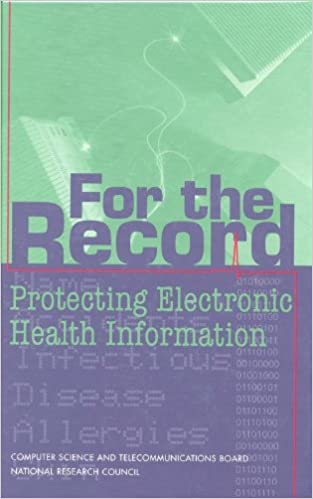For the Record
When you visit the doctor, information about you may be recorded in an office computer. Your tests may be sent to a laboratory or consulting physician. Relevant information may be transmitted to your health insurer or pharmacy. Your data may be collected by the state government or by an organization that accredits health care or studies medical costs. By making information more readily available to those who need it, greater use of computerized health information can help improve the quality of health care and reduce its costs. Yet health care organizations must find ways to ensure that electronic health information is not improperly divulged. Patient privacy has been an issue since the oath of Hippocrates first called on physicians to "keep silence" on patient matters, and with highly sensitive datagenetic information, HIV test results, psychiatric records entering patient records, concerns over privacy and security are growing.
For the Record responds to the health care industry's need for greater guidance in protecting health information that increasingly flows through the national information infrastructure from patient to provider, payer, analyst, employer, government agency, medical product manufacturer, and beyond. This book makes practical detailed recommendations for technical and organizational solutions and national-level initiatives.
For the Record describes two major types of privacy and security concerns that stem from the availability of health information in electronic form: the increased potential for inappropriate release of information held by individual organizations (whether by those with access to computerized records or those who break into them) and systemic concerns derived from open and widespread sharing of data among various parties.
The committee reports on the technological and organizational aspects of security management, including basic principles of security; the effectiveness of technologies for user authentication, access control, and encryption; obstacles and incentives in the adoption of new technologies; and mechanisms for training, monitoring, and enforcement.
For the Record reviews the growing interest in electronic medical records; the increasing value of health information to providers, payers, researchers, and administrators; and the current legal and regulatory environment for protecting health data. This information is of immediate interest to policymakers, health policy researchers, patient advocates, professionals in health data management, and other stakeholders.
Wanneer u de dokter bezoekt, kan informatie over u worden opgeslagen in een kantoorcomputer. Uw tests kunnen naar een laboratorium of een consultatiebureau worden gestuurd. Relevante informatie kan worden doorgegeven aan uw zorgverzekeraar of apotheek. Uw gegevens kunnen worden verzameld door de overheid of door een organisatie die de gezondheidszorg accrediteert of de medische kosten bestudeert. Door informatie gemakkelijker beschikbaar te maken voor degenen die ze nodig hebben, kan een groter gebruik van geautomatiseerde gezondheidsinformatie de kwaliteit van de gezondheidszorg helpen verbeteren en de kosten ervan helpen drukken. Organisaties in de gezondheidszorg moeten echter manieren vinden om ervoor te zorgen dat elektronische gezondheidsinformatie niet op onjuiste wijze openbaar wordt gemaakt. De privacy van patiënten is al een probleem sinds de eed van Hippocrates artsen voor het eerst opriep om "te zwijgen" over patiëntenzaken, en met zeer gevoelige gegevens over genetische informatie, HIV-testresultaten, psychiatrische dossiers die in patientendossiers terechtkomen, neemt de bezorgdheid over privacy en veiligheid toe.
For the Record beantwoordt aan de behoefte van de gezondheidszorgsector aan meer begeleiding bij het beschermen van gezondheidsinformatie die in toenemende mate door de nationale informatie-infrastructuur stroomt van patient naar verstrekker, betaler, analist, werkgever, overheidsinstantie, fabrikant van medische producten, en daarbuiten. Dit boek doet praktische gedetailleerde aanbevelingen voor technische en organisatorische oplossingen en initiatieven op nationaal niveau.
For the Record beschrijft twee belangrijke soorten privacy- en veiligheidsproblemen die voortvloeien uit de beschikbaarheid van gezondheidsinformatie in elektronische vorm: het toegenomen potentieel voor ongepaste vrijgave van informatie die in het bezit is van individuele organisaties (hetzij door degenen die toegang hebben tot geautomatiseerde dossiers of degenen die daarin inbreken) en systemische problemen die voortvloeien uit het open en wijdverspreide delen van gegevens tussen verschillende partijen.
De commissie brengt verslag uit over de technologische en organisatorische aspecten van beveiligingsbeheer, met inbegrip van de basisbeginselen van beveiliging; de doeltreffendheid van technologieën voor de authentificatie van gebruikers, toegangscontrole en encryptie; belemmeringen en stimulansen voor de invoering van nieuwe technologieën; en mechanismen voor opleiding, toezicht en handhaving.
For the Record geeft een overzicht van de groeiende belangstelling voor elektronische medische dossiers; de toenemende waarde van gezondheidsinformatie voor verstrekkers, betalers, onderzoekers en beheerders; en het huidige wet- en regelgevingskader voor de bescherming van gezondheidsgegevens. Deze informatie is van direct belang voor beleidsmakers, onderzoekers op het gebied van gezondheidsbeleid, patiëntenvoorvechters, professionals op het gebied van het beheer van gezondheidsgegevens en andere belanghebbenden.
€32.95

Geef een reactie
Je moet ingelogd zijn op om een reactie te plaatsen.